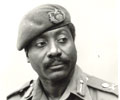Fred Akuffo
This article needs additional citations for verification. (January 2009) |
Frederick William Kwasi Akuffo | |
|---|---|
 Lt. Gen. Fred Akuffo | |
| Chairman of the Supreme Military Council | |
| In office 5 July 1978 – 4 June 1979 | |
| Deputy | Joshua Hamidu |
| Preceded by | Ignatius Kutu Acheampong |
| Succeeded by | Jerry Rawlings |
| Personal details | |
| Born | Frederick William Kwasi Akuffo 21 March 1937 Akropong, Gold Coast |
| Died | 26 June 1979 (aged 42) Accra, Ghana |
| Cause of death | Execution by firing squad |
| Spouse | Mrs. Emily Akuffo |
| Profession | Soldier |
| Military service | |
| Branch/service | Ghana Army |
| Years of service | 1957 - 1979 |
| Rank | Lieutenant General |
| Commands |
|
| Battles/wars | Congo Crisis |
| Other | Organized Operation Keep Right when Ghana changed over to driving on the right in August 1974 |
| Head of State of a military government | |
Lieutenant General Frederick William "Fred" Kwasi Akuffo (21 March 1937 – 26 June 1979) was a Ghanaian soldier and politician. He was Chief of the Defence Staff of the Ghana Armed Forces from 1976 to 1978, and chairman of the ruling Supreme Military Council in Ghana from 1978 to 1979.[1] He became leader of the government in a palace coup against General Kutu Acheampong, and was overthrown and executed in another military coup less than a year later.[2]
Early life and education
[edit]Fred Akuffo was born at Akropong in the Eastern Region of Ghana. He completed his secondary education in 1955 at the Presbyterian Boys' Secondary School in Odumase Krobo. He then enlisted in the Ghana Army in 1957 and trained at the Royal Military Academy, Sandhurst, UK among others, receiving his commission in 1960. He was married to Mrs. Emily Akuffo. He also attended the National Defence College in India in 1973.[3]
Career
[edit]While in the army, he served as commanding officer of the Airborne Training School at Tamale and later the 6th Battalion of Infantry of the Ghana Army between 1969 and 1970. He rose to become the 2nd Brigade Commander. He supervised the change over of traffic flow in Ghana from driving on the left to driving on the right as part of 'Operation Keep Right' which was effected on 4 August 1974. This changeover was successful and largely accident free. He rose to become the Army Commander in April 1974 and Chief of the Defence Staff in April 1976.
Politics
[edit]On 9 October 1975, Fred Akuffo was appointed a member of the ruling Supreme Military Council government due to his position as Ghana's army commander. On 5 July 1978, he led a palace coup to overthrow the head of state, General Ignatius Acheampong.[4] He continued with the ongoing preparations to return Ghana to constitutional rule but his government was also cut short on 4 June 1979 by a military uprising by the junior ranks of the Ghana military led by Flight Lieutenant Jerry John Rawlings and the Armed Forces Revolutionary Council (AFRC).[citation needed]
Execution
[edit]He was executed along with other senior military officers on 26 June 1979 at the Teshie Military Range, Ghana.[5]
References
[edit]- ^ "Brief Profile: Frederick William Kwasi Akuffo". Retrieved 4 August 2022.
- ^ "Brief Profile: Frederick William Kwasi Akuffo". Justice Ghana. Retrieved 28 January 2014.
- ^ "Brief Profile: Frederick William Kwasi Akuffo". Retrieved 4 August 2022.
- ^ "Brief Profile: Frederick William Kwasi Akuffo". Retrieved 4 August 2022.
- ^ "Ghana News - Rawlings confesses "sacrificing" innocent commanders". www.myjoyonline.com. Archived from the original on 10 January 2014.
External links
[edit]See also
[edit]|}
- 1937 births
- 1979 deaths
- Executed Ghanaian people
- Executed military personnel
- Executed presidents
- Defence ministers of Ghana
- Ghanaian soldiers
- Graduates of the Royal Military Academy Sandhurst
- Leaders ousted by a coup
- Leaders who took power by coup
- People who were court-martialed
- People executed by Ghana by firing squad
- Heads of state of Ghana
- Chiefs of Army Staff (Ghana)
- Presbyterian Boys' Senior High School alumni
- Ghanaian Presbyterians
- National Defence College, India alumni
